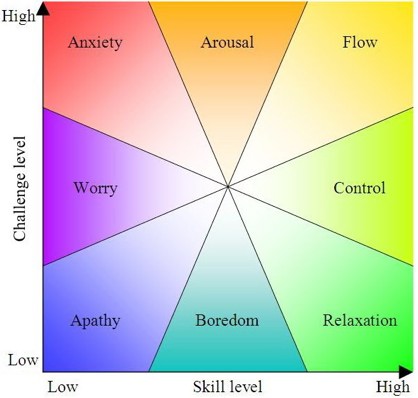The main researcher of flow is the delightfully unpronounceable Mihaly Csikszentmihalyi (Chick-sent-me-high). Generally it is associated with more intrinsic motication for the activity in question, and although you lose sense of yourself and time while you are in flow, you are said to return with a stronger sense of self afterwards.
Conceptualisation of Flow
Flow is certainly a broad concept that can be applied in a number of fields, from education to sport. It has also been studied in a number of different countries, mainly the US and Italy, but also in Japan (Sato, 1984). This suggests that although the context of flow might differ from place to place, the experience may be universal, or at least ubiquitous.
These cross-cultural studies are important because flow was defined initially through interview with people. So these people are giving their subjective interpretation of the state and not necessarily an accurate description of the objective state of flow (if there is one). For instance, my description of flow is limited by my vocabulary. So to really say that the state is universal, more studies of non-English speaking countries could be conducted, each with their own cultural nuances and language, not to mention non-rich countries.
However, another perhaps more important step is to measure the physiological and neurological correlates of flow. Although I could not find a direct study of this, I would propose that the flow state may be characterised by activation in the dopamine system, in the ventral tegmental area of the brain. Such brain activity is thought to be important in attention, particularly with 'important' stimuli (Donahoe and Palmer, 1993), and there is some evidence that this activity is involved in tasks that you might expect to produce flow (eg, video games; Koepp, 1998). But, I could not find one that measured flow at the same time.
This idea makes some theoretical sense also, as dopamine serves to label stimuli as appetitive, and is associated with pleasurable feelings. This might support the suggestion that flow is a state of 'ecstasy' that we like to return to - but would beg the question of whether the dopamine release is 'tagged' to the state, the activity, or both.
Theoretical issues of flow
Flow is theoretically the result of a certain balance between challenge and skill (or resources), and the theory is presented as a general model that covers all behaviours. But does a high level of challenge and skill always result in flow? Also, are there any differences in the level of skill required for flow to occur, or is it always context-specific?

For instance, the flow model began life by stating that one simply had to match skill with challenge - even if they are low. Later, this section of the model was labelled 'apathy', due to inconsistent results. Additionally, some studies have failed to find a difference between the flow state and the boredom/relaxation state in terms of the constituent factors that make up flow (eg concentration and intrinsic motivation; Ellis et al, 1994). Perhaps these inconsistencies were due to individual differences rather than a fault in the model. Or perhaps the flow state only results from certain types of activity.
Measuring Flow
ESM is usually used to measure flow. "Experience Sampling Method" is where participants in studies get a pager, which beeps through the day, usually at somewhat random intervals, and they answer question then and there on what they are doing, how they feel etc. The ESM method is quite an innovative way of measuring flow, but it relies on self-report, and therefore an individual's interpretation of their state, rather than an objective measurement of that state itself. The data from ESM are assumed to be valid, from what I could tell. To further validate measurements of flow, self-report measurements could be correlated with neurological measurements taken while a person is performing an activity which is reported to generate flow.
I'm don't think studies have already been done though. Or at least, I couldn't find any if there are - please leave a comment below if you know of any!
If you found any of this interesting, you might like the TED talk on flow by Csikszentmihalyi himself:
References:
Donahoe, J.W. and D. C. Palmer (1993). Learning and Complex Behavior, Allyn and Bacon.
Ellis, G. D., Voelkl, J. E.,&Morris, C. (1994). Measurements and analysis issues with explanation of variance in daily experience using the Flow model. Journal of Leisure Research, 26, 337–356.
Koepp, M. J. (1998) Evidence for striatal dopamine release during a video game, Nature, 393, 266-268
Sato, I. (1984). Bosozoku no Esunographi [An ethnography of motorcycle gangs]. Tokyo: Keiso Shobo. (I admit I have not actually read this!)





Comments